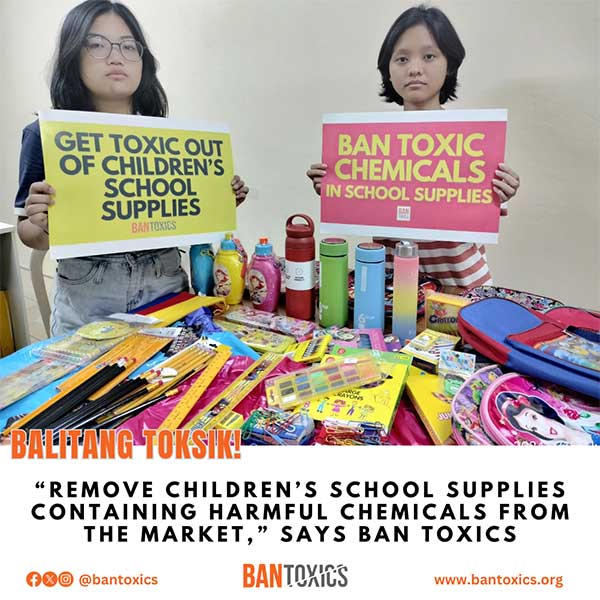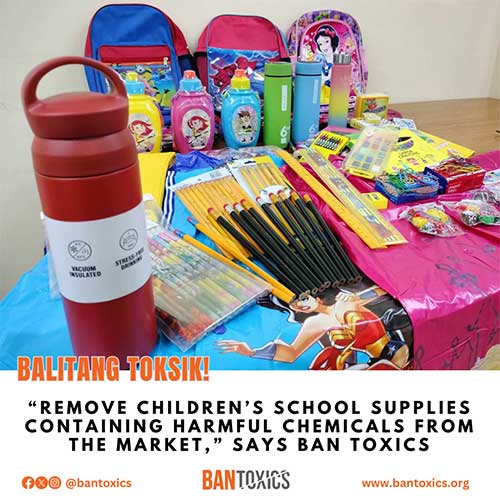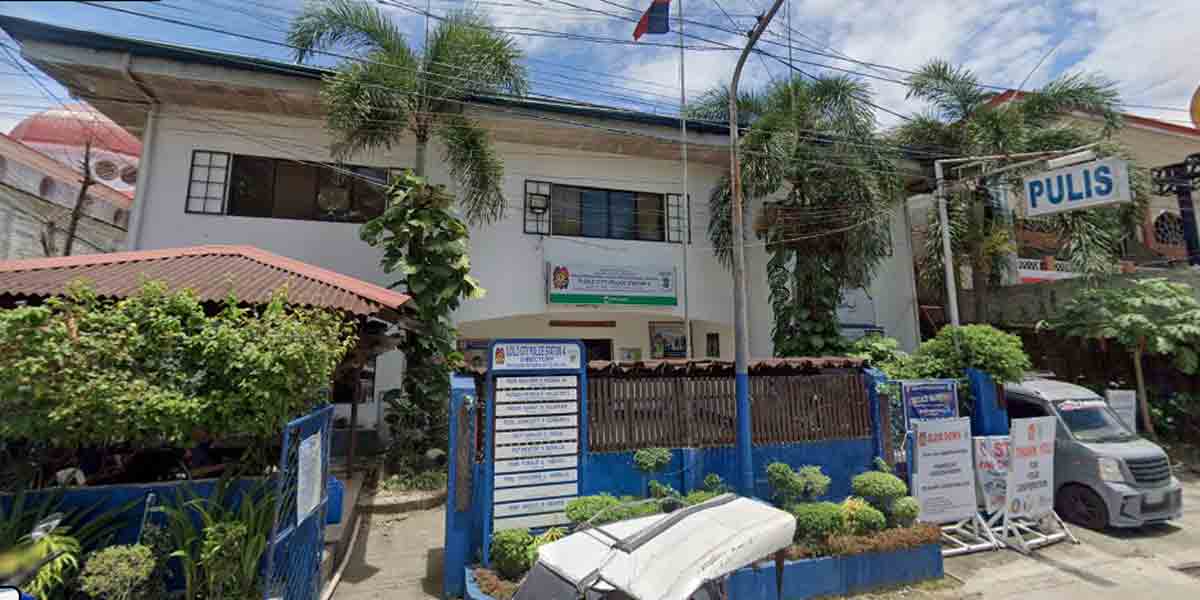
Toxic watchdog group BAN Toxics has raised urgent concerns over the proliferation of children’s products laced with harmful chemicals, particularly school supplies.
It urged the Food and Drug Administration (FDA) to order a mandatory recall of these products to protect children from toxic exposure.
The group conducted test-buys on 12 selected school items, including kiddie backpacks, water containers, pencils, pencil cases/pouches, sharpeners, painted rulers, crayons, crayon casing, various erasers, watercolors, raincoats and colorful vinyl paper clips.
These items were purchased in three different locations–Manila, Pasay, and Quezon City–for chemical analysis and product labeling review.
Using a Vanta C Series HH XRF Analyzer, the group screened and discovered alarmingly high levels of toxic lead in two of the samples: 11,900 parts per million (ppm) in a kiddie backpack and 48,000 ppm in a water container. Additionally, all of the school supplies lacked complete product information and warning labels necessary for consumer health and safety.
“Given that the use of lead in school supplies is prohibited by national regulations and poses a significant risk to children’s safety and health, we urge the FDA to immediately review, ban, recall, and withdraw these products. Immediately conducting sampling, testing, and verifying these school supplies by the FDA are crucial for safeguarding children’s health.”
“We need to strictly enforce regulations on the use of harmful chemical additives in children’s products such as school supplies. Manufacturers and importers must comply with the regulations on hazardous chemicals in products intended for children,” said Thony Dizon, Toxics Campaigner of BAN Toxics.

These findings send a warning signal to retailers and wholesalers of school supplies that unregistered and unnotified products are punishable by law. They should voluntarily remove from their shelves products that do not meet the safety standards of the FDA,” the group added.
BAN Toxics urges the Philippine government to enact a law for safe and non-hazardous children’s products. This law should ensure transparency and traceability in the use of chemicals, and enforce product labeling and safety standards to protect the children from adverse health effects of toxic exposure.
In 2018 the Food and Drug Administration issued a public health warning regarding certain school supply products found to have unacceptable levels of heavy metals, such as lead.
According to a study published by the U.S. Consumer Product Safety Commission (CPSC), lead exposure in children can have long-lasting or permanent adverse health effects. These include neurological damage, delayed mental and physical development, attention and learning deficiencies, neurocognitive deficits, and hearing problems.
To protect children from exposure to toxic chemicals in school supplies, BAN Toxics proposes the following recommendations:
For the national government to enact legislation that prohibits the use of hazardous chemicals in children’s products, such as school supplies, to safeguard children’s rights to safe and toxic-free products.
For the regulatory agencies and local government officials to establish a consumer action center for immediate product verification, consumer related concerns and complaints in public markets and malls, and proactively conduct joint post marketing surveillance and inspection for product safety, quality and standards.
For manufacturers, to comply with existing regulation in the country, ensure product certification and information transparency on the use of toxic chemicals, and consider transitioning to non-toxic ingredients or materials in the production of children’s products.
For sellers, to only offer registered and notified school supplies for sale, ensuring compliance with product safety and labeling requirements, and making safe and non-toxic school supplies available to consumers.
For consumers, to always check and read labels before purchasing, seek product information and FDA certification, avoid colorful fabrics that may contain toxic lead, avoid plastic PVC school supplies that may contain phthalates, and report any school supplies that do not meet product safety standards to regulatory agencies.
This advocacy effort is part of the group’s Toxic-Free and Waste-Free School Program (TFSP), which encourages educational institutions to adopt sound chemicals and waste management in their operations. This initiative aims to protect students and faculty members from the harmful effects of toxic chemicals and hazardous wastes.



















